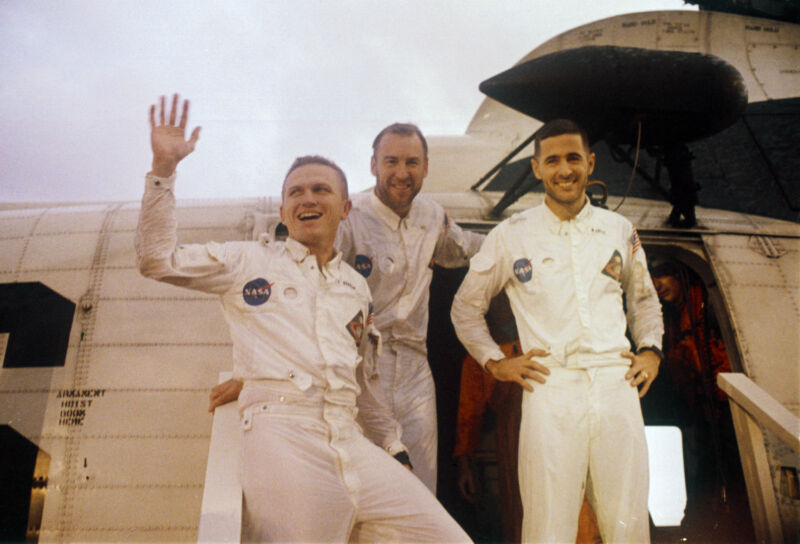
Frank Borman, an Air Force test pilot, astronaut, and accomplished businessman who led the first crew to fly to the Moon in 1968, died Tuesday in Montana, NASA said Thursday. He was 95 years old.
“Today we remember one of NASA’s best," NASA Administrator Bill Nelson said in a statement. "Astronaut Frank Borman was a true American hero. Among his many accomplishments, he served as the commander of the Apollo 8 mission, humanity’s first mission around the Moon in 1968."
Borman, joined by crewmates Jim Lovell and Bill Anders, orbited the Moon 10 times over the course of about 20 hours. They were the first people to see the Earth from another world, a memory of "wonderment" Borman recalled decades later. Apollo 8 produced one of the most famous photos ever taken, the iconic "Earthrise" showing a blue orb—the setting for all of human history until then—suspended in the blackness of space over the charcoal gray of the Moon's cratered surface.
"The Earth looked so lonely in the Universe," Borman said in a NASA oral history. "It's the only thing with color. All of our emotions were focused back there with our families as well, so that was the most emotional part of the flight for me."
Frank Borman, cold warrior
Borman was born in Gary, Indiana, on March 14, 1928, and raised in Tucson, Arizona. He learned to fly airplanes as a teenager, then attended the US Military Academy at West Point before earning his commission in the Air Force to start training as a fighter pilot. Following a similar career path as other early astronauts, Borman became an experimental test pilot, receiving a master's degree in aeronautical engineering from Caltech, and served a stint as an assistant professor at West Point.
NASA accepted applications for a second class of astronauts in 1962 to follow the original Mercury Seven. Borman was one of the "New Nine" astronauts, and he reported for training in Houston.
Known for his no-nonsense approach to spaceflight, Borman was razor-focused on mission objectives. For Apollo 8, those were to fly to the Moon, take pictures of future Apollo landing sites, and return to Earth safely, and importantly, do it before the Russians. He didn't want to take a video camera on Apollo 8, worried that it would distract from more important tasks, but was overruled by NASA management. "I was dumb in that," Borman later admitted.
The live television broadcast from Apollo 8 on Christmas Eve became one of the most memorable moments in the history of America's space program. Borman, Lovell, and Anders read from the Book of Genesis, closing the broadcast with holiday wishes for an audience of a billion people watching on television: "From the crew of Apollo 8, we close with good night, good luck, a merry Christmas, and God bless all of you, all of you on the good Earth."
After returning from the Moon, Borman recalled the only guidance he received from Julian Scheer, a NASA public relations official, regarding what to say to people back on Earth: "Do something appropriate."
The rest was left up to Borman. He credited the wife of a friend for the advice to read from the Book of Genesis. "I thought it was wonderful," Borman said.
Borman's commentary on the Moon's appearance from an altitude of 60 nautical miles reads like a brutal description of a barren wasteland: "I know my own impression is that it’s a vast, lonely forbidding type existence, great expanse of nothing, that looks rather like clouds and clouds of pumice stone, and it certainly would not appear to be a very inviting place to live or work."
Apollo 8 was Borman's second flight into space, following a two-week flight in low-Earth orbit in 1965 on the Gemini 7 mission, the longest-duration spaceflight until that time.
NASA managers appointed Borman to the board investigating the Apollo 1 fire in 1967, which killed Gus Grissom, Ed White, and Roger Chaffee during a ground test at Cape Canaveral, Florida. Borman played a critical role in the aftermath of the tragedy, serving as the only voice for the Astronaut Office on the board of inquiry and vehemently defending the Apollo program to Congress.
These were dark times for NASA, with real risk that the agency would miss its directive from President Kennedy to land an astronaut on the Moon by the end of the 1960s. "The more we probed for answers, the more depressed the people in the investigation got," Borman later wrote. But the Moon program survived, and Borman oversaw the implementation of changes to the Apollo spacecraft at North American Aviation in Downey, California, to eliminate the problems that led to the fire.
Article From & Read More ( Frank Borman, commander of the first mission to orbit the Moon, has died - Ars Technica )https://ift.tt/wypC97n
Science
No comments:
Post a Comment